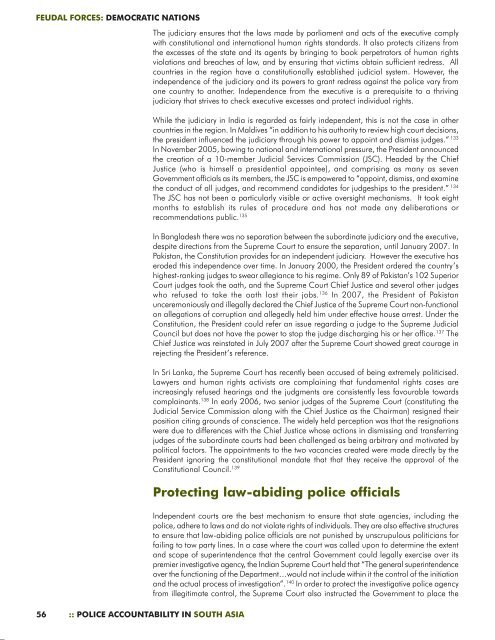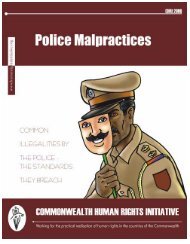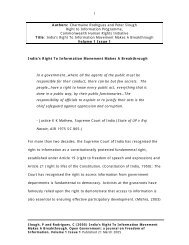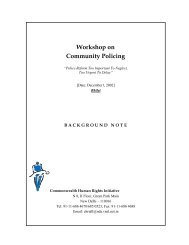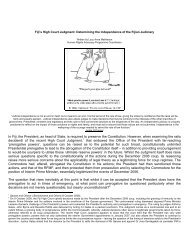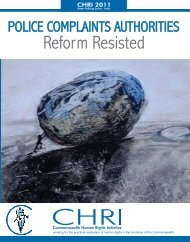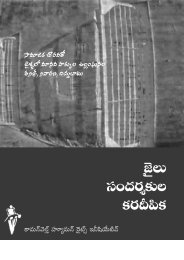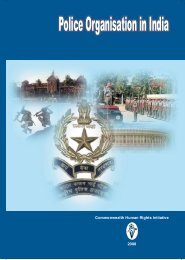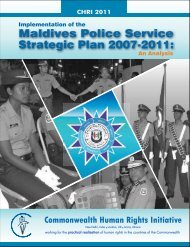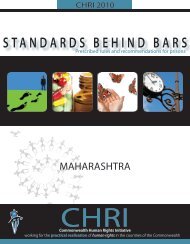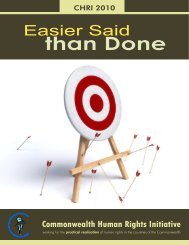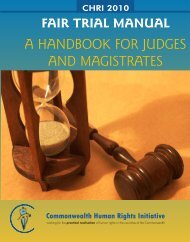Feudal Forces: Democratic Nations - Police Accountability in
Feudal Forces: Democratic Nations - Police Accountability in
Feudal Forces: Democratic Nations - Police Accountability in
Create successful ePaper yourself
Turn your PDF publications into a flip-book with our unique Google optimized e-Paper software.
FEUDAL FORCES: DEMOCRATIC NATIONS56 :: POLICE ACCOUNTABILITY IN SOUTH ASIAThe judiciary ensures that the laws made by parliament and acts of the executive complywith constitutional and <strong>in</strong>ternational human rights standards. It also protects citizens fromthe excesses of the state and its agents by br<strong>in</strong>g<strong>in</strong>g to book perpetrators of human rightsviolations and breaches of law, and by ensur<strong>in</strong>g that victims obta<strong>in</strong> sufficient redress. Allcountries <strong>in</strong> the region have a constitutionally established judicial system. However, the<strong>in</strong>dependence of the judiciary and its powers to grant redress aga<strong>in</strong>st the police vary fromone country to another. Independence from the executive is a prerequisite to a thriv<strong>in</strong>gjudiciary that strives to check executive excesses and protect <strong>in</strong>dividual rights.While the judiciary <strong>in</strong> India is regarded as fairly <strong>in</strong>dependent, this is not the case <strong>in</strong> othercountries <strong>in</strong> the region. In Maldives “<strong>in</strong> addition to his authority to review high court decisions,the president <strong>in</strong>fluenced the judiciary through his power to appo<strong>in</strong>t and dismiss judges.” 133In November 2005, bow<strong>in</strong>g to national and <strong>in</strong>ternational pressure, the President announcedthe creation of a 10-member Judicial Services Commission (JSC). Headed by the ChiefJustice (who is himself a presidential appo<strong>in</strong>tee), and compris<strong>in</strong>g as many as sevenGovernment officials as its members, the JSC is empowered to “appo<strong>in</strong>t, dismiss, and exam<strong>in</strong>ethe conduct of all judges, and recommend candidates for judgeships to the president.” 134The JSC has not been a particularly visible or active oversight mechanisms. It took eightmonths to establish its rules of procedure and has not made any deliberations orrecommendations public. 135In Bangladesh there was no separation between the subord<strong>in</strong>ate judiciary and the executive,despite directions from the Supreme Court to ensure the separation, until January 2007. InPakistan, the Constitution provides for an <strong>in</strong>dependent judiciary. However the executive haseroded this <strong>in</strong>dependence over time. In January 2000, the President ordered the country’shighest-rank<strong>in</strong>g judges to swear allegiance to his regime. Only 89 of Pakistan’s 102 SuperiorCourt judges took the oath, and the Supreme Court Chief Justice and several other judgeswho refused to take the oath lost their jobs. 136 In 2007, the President of Pakistanunceremoniously and illegally declared the Chief Justice of the Supreme Court non-functionalon allegations of corruption and allegedly held him under effective house arrest. Under theConstitution, the President could refer an issue regard<strong>in</strong>g a judge to the Supreme JudicialCouncil but does not have the power to stop the judge discharg<strong>in</strong>g his or her office. 137 TheChief Justice was re<strong>in</strong>stated <strong>in</strong> July 2007 after the Supreme Court showed great courage <strong>in</strong>reject<strong>in</strong>g the President’s reference.In Sri Lanka, the Supreme Court has recently been accused of be<strong>in</strong>g extremely politicised.Lawyers and human rights activists are compla<strong>in</strong><strong>in</strong>g that fundamental rights cases are<strong>in</strong>creas<strong>in</strong>gly refused hear<strong>in</strong>gs and the judgments are consistently less favourable towardscompla<strong>in</strong>ants. 138 In early 2006, two senior judges of the Supreme Court (constitut<strong>in</strong>g theJudicial Service Commission along with the Chief Justice as the Chairman) resigned theirposition cit<strong>in</strong>g grounds of conscience. The widely held perception was that the resignationswere due to differences with the Chief Justice whose actions <strong>in</strong> dismiss<strong>in</strong>g and transferr<strong>in</strong>gjudges of the subord<strong>in</strong>ate courts had been challenged as be<strong>in</strong>g arbitrary and motivated bypolitical factors. The appo<strong>in</strong>tments to the two vacancies created were made directly by thePresident ignor<strong>in</strong>g the constitutional mandate that that they receive the approval of theConstitutional Council. 139Protect<strong>in</strong>g law-abid<strong>in</strong>g police officialsIndependent courts are the best mechanism to ensure that state agencies, <strong>in</strong>clud<strong>in</strong>g thepolice, adhere to laws and do not violate rights of <strong>in</strong>dividuals. They are also effective structuresto ensure that law-abid<strong>in</strong>g police officials are not punished by unscrupulous politicians forfail<strong>in</strong>g to tow party l<strong>in</strong>es. In a case where the court was called upon to determ<strong>in</strong>e the extentand scope of super<strong>in</strong>tendence that the central Government could legally exercise over itspremier <strong>in</strong>vestigative agency, the Indian Supreme Court held that “The general super<strong>in</strong>tendenceover the function<strong>in</strong>g of the Department…would not <strong>in</strong>clude with<strong>in</strong> it the control of the <strong>in</strong>itiationand the actual process of <strong>in</strong>vestigation”. 140 In order to protect the <strong>in</strong>vestigative police agencyfrom illegitimate control, the Supreme Court also <strong>in</strong>structed the Government to place the


